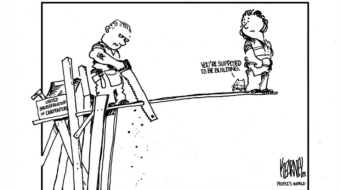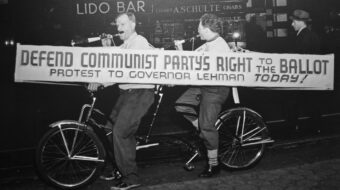The continuing effort by the world’s largest meatpacking giant to keep out a union has been transformed by its workers into a drive in Congress to streamline the way all American workers win the right to union representation.
Last month Smithfield Tar Heel worker Keith Ludlum testified in support of the Employee Free Choice Act (EFCA) before the House Subcommittee on Health, Employment, Labor and Pensions. The Free Choice act would prevent companies from forcing so-called “free elections” when the majority of workers in a potential bargaining unit sign cards indicating their desire for union representation.
Under the current system of “secret ballot” elections, when workers decide to have union representation by signing union cards, the company, like Smithfield, can drag the process out for years through intimidation, coercion and illegal firings. Under the Free Choice Act employees would sign cards indicating support for the union and when a majority is reached, the employer is required to recognize the union.
Fighting for a union since 1994
The situation at the Smithfield plant in Tar Heel, N.C., is perhaps the classic example of the problem that would be solved with passage of the new law. Workers at Smithfield first came to the United Food and Commercial Workers union (UFCW) in 1994, seeking a voice on the job.
During each of the two subsequent elections for the union, Smithfield harassed, threatened and spied on the workers suspected of supporting the union. In each of the “free elections” the workers narrowly lost the right to be represented by the UFCW.
On Feb. 8, in moving testimony before the Congressional subcommittee, Ludlum exposed abuses at Smithfield and made a compelling case for passage of the EFCA.
In 1994, Ludlum was fired by Smithfield for trying to organize a union. The UFCW filed a claim on his behalf and in 2006, after years of court action, the National Labor Relations Board ordered that he be reinstated in his previous job with back pay. Determined to fight injustice at the plant, he quit a secure, well-paid job and returned to Smithfield.
When one congressman asked him why he would do something like that Mr. Ludlum, who is a veteran of “Desert Storm,” the first war in Iraq, replied:
“The straw that broke the camel’s back was when a fellow worker broke his leg on the job. The very next day, when I came to work, he was sitting in the break room with a full leg cast and crutches. I asked him what he was doing back at work so soon. He said he didn’t want to lose his job, and the company did not want to report to OSHA [the Occupational Health and Safety Administration] a lost work day due to injury.
“For weeks, I watched this man hobble through the parking lot and across the greasy, wet floors of the kill floor and cut departments to get back and forth to the livestock yards,” Ludlum said. “Finally, one day, I approached the supervisors and asked them if the worker could park his car in a space near the livestock yard to avoid further injury. They told me only managers could park there. He’s only a worker.”
Debunking the ‘free elections’ argument
Unmoved, Republicans on the committee basically toed the “free elections” line. They opposed the Free Choice act, they said, because it would take away from the workers the right to a “secret, fair election” and replace it with a system of card check-offs “that would allow people to be bullied,” presumably by union supporters.
Debunking that argument, Ludlum described the scene of the 1997 election at Smithfield:
“On both days of the 1997 election, Bladen County deputy sheriffs, dressed in battle gear with guns, lined the long driveway leading to the plant…. As workers passed the lines of police, they saw company management standing with the head of the sheriff’s office.”
Another Republican lawmaker said he still had “trouble” supporting the Free Choice act because “it denies workers on the job the same freedoms all Americans had on Nov. 7.”
Ludlum shot back, “With all due respect sir, when you voted on Nov. 7, did the people who supported the candidate you didn’t vote for line the approach to your polling place with deputies and members of the other party pointing sawed off shotguns at you?”
35,000 citations vs. 42
Many veterans of the labor movement say Republicans “concern” about potential abuse of workers’ rights by unions is ridiculous. The NLRB, itself a government body, has, in its entire history, cited only 42 instances in which a union took liberty with the law (in most of these cases the companies involved were cited for taking unfair advantage). But the NLRB has cited companies for violation of the law at least 35,000 times.
The NLRB has, in Smithfield’s case, found massive violations of labor law and has cited the company for “creating an atmosphere of intimidation and coercion” in order to prevent the formation of the union. The company, of course, has successfully used current labor law to do this, and would have a much harder time keeping out the union under the Free Choice act.
Prior to the initial NLRB ruling against Smithfield in 2000, Sherrie Bufkin, a Smithfield supervisor, testified before a panel of U.S. senators that she had, during the specified NLRB “free secret election period,” fired people who were trying to organize a union.
She swore before the Senate Health, Education and Labor Committee that “Smithfield Foods ordered me to fire employees who supported the union, telling me it was either my job or theirs.”
Company-paid spies
Also during that first “free secret election,” LaTasha Peterson, a former Smithfield worker, was part of the company’s “A-Team.” The “team” was a group of workers who were paid by Smithfield to spy on their co-workers and campaign against the union.
“I earned twice as much money campaigning against the union, and I didn’t have to do any work,” said Peterson. “I know what I did was wrong. I have union representation at my job now and I can see how much better it is to have a union at work.”
In 1999, Peterson testified before the NLRB, blowing the whistle on the company. Her heroic testimony was instrumental in getting the NLRB to rule against Smithfield.
Confirming the claims of Smithfield workers, the NLRB ruled that company witnesses had “continually lied under oath” and that “Smithfield managers conspired with the local sheriff’s department to physically intimidate and assault union supporters,” all during a so called “free secret ballot” cherished by Republican lawmakers.
Why Free Choice is needed
Passage of the Employee Free Choice Act into law is widely seen now as critical to stopping abusive companies like Smithfield and to preserving and extending union organizing rights of all American workers. The Employee Free Choice Act would give all workers basic rights like freedom of association, freedom of speech and redress of grievances.
While Smithfield in Tar Heel, N.C., is a dramatic example of the abuse workers face when they try to exercise their right to organize, there are thousands of other examples in the other 49 states. As Congress went into in recess, lawmakers headed back home. Now working families and allies organized a week of actions including rallies, roundtables and news conferences all around the country to tell their lawmakers it’s time to pass the Employee Free Choice Act.
thewritergdr @ europe.com









